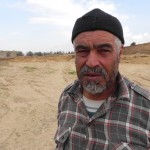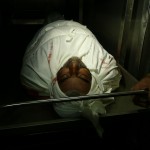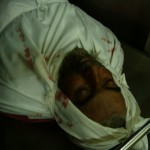20 January 2011 / International Solidarity Movement, Vera Macht
It had been only eight days since the last innocent was killed. People die here one after another, killed one by one, without consequences, without justice, without an outcry in the media. Innocent civilians trying to make a living amidst the stifling four-year siege. Palestinian civilians, whose lives become only an entry in the statistics: “So that’s what I can do: register it in my notebook. It is registered, and there is an empty line after Shaban’s name. That is for those who they kill tomorrow,” wrote the American writer Max Ajl after the farmer Shaban Karmout was killed. It took eight days, and the place was filled. Amjad ElZaaneen was 17 years when he was killed on Tuesday.
Amjad collected stones that morning, the 18th of January, as he did every morning with his three cousins and his brother, the youngest of whom was eleven. Five boys, children, with a horse and a cart full of stones, about 300m from the border with Israel, and near to the village of Bait Hanoun. They had just loaded their cart full as they saw Israeli tanks and bulldozers coming to invade the land for an unknown reason. A group of resistance fighters approached the area, including fighters from PFLP and the Communist Party, to push them out and prevent them from again uprooting the land. It was a symbolic action: the country has been destroyed hundreds of times before by tanks and bulldozers, and the resistance the fighters can sustain is nothing in comparison to the brutal force of the Israeli army. Amjad and the others ran for their lives and arrived safely home.

The young boys broke out in panic and ran off to get to safety. Ambulances and people living nearby arrived to try to rescue the boys, waving white flags, but that didn’t stop the shooting. It was a long time before they managed to reach them.
Ismael Abd Elqader ElZaaneen, 16 years old, is now in hospital in Bait Hanoun with bandages on nearly every part of his body. “We ran in all directions, but they fired about ten artillery shells at us. I got shrapnel deep in my back and smaller pieces all over my body. But I kept running nevertheless, until I got to the main road from Bait Hanoun.” Even the injured Sharaf somehow managed to reach refuge at the main street without being hit by the shelling again. The eleven-year old Abdel Qader Oday Elzaaneeen was slightly injured by shrapnel to his cheek. He was standing in the hospital and crying, visibly in shock, his cousin is dead, and his brothers are injured severely. “I have no idea why the Israelis have done this,” he says quietly. Amjad was too young to die today, by a grenade that has torn his stomach apart.
As his mother heard what happened, she collapsed in the hospital. Even as she regained consciousness, she continued lying down silently, her eyes closed. How can the world be still there if her son is no more.

Each of the relatives, waiting in the hospital, could be the next victim: as a farmer on the field, as a shepherd, or collecting stones. Today Amjad ElZaaneen was the next name on the list of innocent deaths, of senseless killings. On the long list on our laptops, on all of our consciences.




